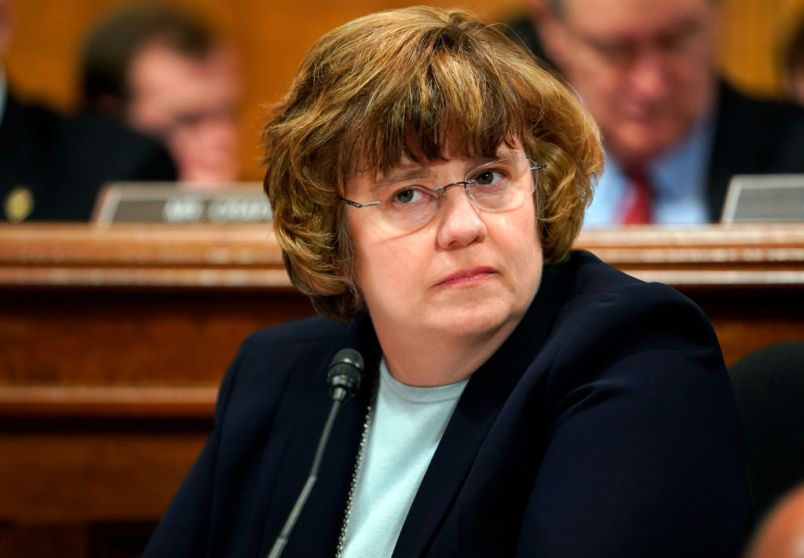The sex crimes prosecutor tapped by Judiciary Republicans to question Christine Blasey Ford about her Brett Kavanaugh allegations spent a relatively small amount of time asking Blasey Ford about the sex crime she alleged and more time on questions about the steps Blasey Ford took in coming forward with the allegation.
As Thursday’s hearing wore on, prosecutor Rachel Mitchell’s lines of questioning took increasingly bizarre turns, as she quizzed Blasey Ford about how she found her lawyers, who paid for her polygraph, her fears of flying and what interactions she had with GOP committee staff.
At times, it felt as if Mitchell was seeking to help Republicans’ prop up their defense of their handling of Blasey Ford’s allegations. Some of Mitchell’s questions also seemed to feed into the suggestion that Blasey Ford was being used by Democrats to smear Kavanaugh.
Senate Judiciary Chairman Chuck Grassley’s office did not respond to TPM’s inquiry as to whether Judiciary Republicans offered Mitchell guidance for her line of questioning. Sen. John Cornyn told TPM that he “believed” Mitchell came up with the questions on her own.
An extended line of questioning from Mitchell focused on reports that Blasey Ford feared flying — which was used to explain why she had sought a delay in this week’s hearing.
“In fact you fly fairly frequently for your hobbies and you’ve had to fly for your work, is that true?” Mitchell asked.
“Correct, unfortunately,” Blasey Ford said.
Other parts of her questioning focused on Blasey Ford’s decision to first turn to her congresswoman, Rep. Anna Eshoo (D-CA), to offer the allegations and then through a letter to Sen. Dianne Feinstein. She followed up on those questions with inquiries about any other communications she might have had with other lawmakers, which seemed to confuse Blasey Ford.
“Did you or anyone on your behalf speak to any member of congress or congressional staff about these allegations?” Mitchell asked.
“I personally did not,” Blasey Ford responded
“So my question was did you or anybody on your behalf?” Mitchell pressed
“What do you mean? Did someone speak for me?” Blasey Ford asked in response.
“Somebody that is working with you, or helping you, did somebody at your behest, on your behalf, speak to someone in Congress or staff?” Mitchell clarified.
“I’m not sure. I’m not sure how those exchanges went but I did not speak to anyone,” Blasey Ford answered.
On repeated occasions, Mitchell brought up the polygraph to which Blasey Ford submitted. She quizzed Blasey Ford on who advised her to sit for it, and how she paid for it. At times Blasey Ford was flummoxed by the questions — she said she didn’t know yet who paid for it — until her lawyer Deborah Katz interjected that her legal team covered the cost of the examination.
Mitchell also questioned Blasey Ford on who was paying her legal fees.
“It’s my understanding that some of my team is working on a pro bono basis, but I don’t know the exact details,” Blasey Ford said, before her attorney Michael Bromwich confirmed that both he and Katz are representing her pro bono.
Mitchell wrapped up her questioning with a wind up about the best practices for interview trauma victims and how those interviews are usually done with a trained expert in a private setting that let’s the victim lead the conversation, instead of the five minute increments of questioning at Thursday’s hearing.
Mitchell asked Blasey Ford to confirm that she was advised to get an attorney, who in turn advised her to take the polygraph.
“Instead of submitting to an interview in California, we’re having an hearing here today in five minute increments, is that right?” Mitchell asked as her final question.
There were audible gasps in the room.







Yes, yes, yes, because Dr. Blasey Ford personally set the parameters of the hearing and those 5 minute intervals.
Which almost certainly contain the requirement of interviewing every possible witness. Because all sorts of corroborating or impeaching details can come out of those interviews.
This just proves that ALL Republicans are lying, treasonous, immoral scum of the Earth. Especially this joke of a “woman” who is out there shitting all over women and victims of sexual violence.
Eat shit - every last Republican sub-human in this country.
Do you believe in God?
Unbelievable.
Ms. Mitchell seemed completely surprised when Sen Grassley interrupted her five minutes into her initial questioning, and explained the five minutes on five minutes off procedure. I don’t know how a prosecutor could be effective in the frame work. Maybe I missed the “harping” part but don’t think she had much effect at all on either Ford or Kavanaugh. It was kinda weird.
Rachel Mitchell was unprepared and incompetent. She did an awful job as a “female assistant” and as christian inquisitor. She seem even for the basic 5 minutes format for questioning. Despite her incompetence, I think that the Senate Judiciary Committee should have allowed to her to complete her questioning of the accused sexual predator and rapist nominee.